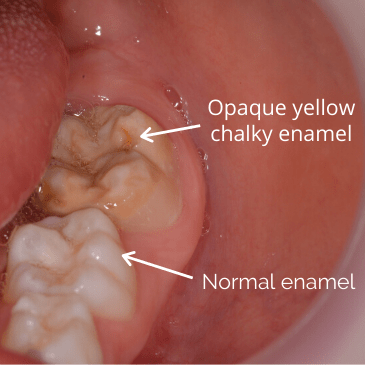Get the facts on chalky molars
Get the facts on chalky molars
We can often be quick to think that any form of dental decay is due to poor diet or brushing habits. But ‘chalky molars’ is a condition that affects a child’s tooth enamel – and is unrelated to what they eat or how well they brush. It can produce pain and sensitivity and will typically affect a tooth’s colour and composition. So what does cause chalky molars? And as a parent, what can you do about it?
What exactly are chalky molars?
Chalky molars – medically known as ‘enamel hypomineralisation’ – is a dental defect where the surface coating of a child’s tooth has developed irregularly.
Instead of a hard enamel coating, the tooth has patches of soft enamel, making it vulnerable to tooth decay.
Dental professionals are not entirely sure what causes chalky molars. But it does appear that children who experienced illness between birth and age three are more susceptible.
However, many children can be unwell during this period without having enamel problems. So, although we know that individual susceptibility plays a part, there’s still plenty of unknown about chalky molars.
This means that, as a parent, you can breathe a sigh of relief that the condition isn’t related to your child’s diet or brushing habits.
What behaviours may indicate your child has this condition?
Chalky molars can cause a child’s teeth to become extremely sensitive. But if your child isn’t talking or can’t clearly express their discomfort yet, certain behaviours may indicate they have the condition.
For instance, your child may be:
- Avoiding using specific teeth when they eat
- Upset or uncooperative when brushing specific teeth or areas of the mouth
- Avoiding certain cold, hard or crunchy foods
What physical signs should you look for?
Chalky molars get their name from the fact that the enamel crumbles easily. This is in comparison to the usually shiny, hard surface of normal enamel.

Accordingly, the first physical sign you might notice is that the enamel of your child’s tooth is a different colour or more opaque than the rest. It could range from unnaturally white to creamy yellow or brown.
Most of the time, this discolouration is restricted to one small spot on the tooth. However, in severe cases the whole tooth may be affected.
Also bear in mind that the condition might not necessarily involve all your child’s molars. It’s just as likely to affect a single tooth.
What issues can chalky molars lead to?
Chalky molars can lead to a range of problems. Some of the most common include:
- Sensitivity
- Rapid tooth decay
- Toothache
- Abscessed teeth
And remember, chalky molars do not always lead to tooth decay.
Decay can arise from the condition because bacteria can penetrate a weakened tooth more easily. Plus, sensitive teeth may mean your child avoids brushing, resulting in an increase in plaque.
Treating and managing chalky molar issues
So you’ve identified that your child has chalky molars. What next?
Chalky molars can involve some difficult decisions that may require a visit to a specialist paediatric dentist. These dentists have the expertise when it comes to minimising your child’s tooth sensitivity, improving their quality of life and providing a long-term plan – all with minimal visits to a clinic.
Keep in mind that chalky molars can be incredibly painful, particularly when exposed to cold water and air spray while in the dentist’s chair. That’s why repeated temporary measures can turn an initially cooperative and brave child into a fearful one who dreads check-ups. This highlights the importance of visiting a specialist.
While treatment will depend on the severity of your child’s condition, their age, and how they cope with dental treatment, there are some standard ways to handle chalky molars, which include:
- Fissure sealants
- Tooth-coloured fillings
- Stainless steel crowns
- Tooth removal
What can you do to prevent chalky molars?
While you can’t prevent chalky molars from happening, regular check-ups will allow your dentist to identify the condition early and put measures in place to minimise their impact.
That’s why it’s critical that your child has regular dental check-ups. This is particularly important around the ages of two and six (as children are likely to develop new molars at these ages).
Understandably, many parents haven’t yet taken their two-year-old to a dentist. But to ensure you uncover any potential problems early, this is 100% necessary.
If you have any concerns at all, it’s best to make an appointment straight away.
But in the meantime…
Keep your child’s teeth clean by brushing twice daily – once after breakfast, and once before bed.
We recommend brushing for your child up to eight years of age. If they want independence as they get older, it’s fine to let them brush their own teeth. But we suggest you ‘check to make sure everything’s clean’ afterwards. This is especially important if they’re avoiding brushing their molars due to pain.
Also, maintain a healthy diet for your child. Chalky molars are softer than normal teeth, so you need to keep sugar and acids to a minimum.
A final word of comfort
Remember that as a parent, you’re not to blame for chalky molars.
A good rule of thumb: if the rest of your child’s teeth are free from decay, chances are it’s an unavoidable developmental dental defect.
While you couldn’t have prevented your child from having this condition, you do have the power help them manage it.
There are many ways to deal with chalky molars. Begin by visiting a specialist at Norwest Paediatric Dentistry. We focus on children’s dental issues and can help your child on their way to having happy, healthy teeth.
Book an appointment today
